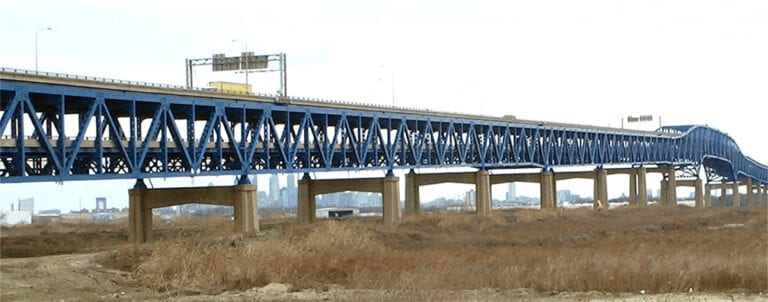The state with the highest fuel taxes in the nation needs more money — a LOT more money — to fix crumbling bridges and highways, according to the Pennsylvania Department of Transportation (PennDOT). The agency’s PennDOT Pathways web page says the current $6.9 billion budget is $8.1 billion short of the $15 billion it claims are needed to make repairs.
PennDOT Secretary Yassmin Gramian, in an Associated Press article, blamed current funding methods for the shortfall.
“Our reliance on funding models from the last century leaves us especially vulnerable to fund losses stemming from volatile economic conditions and the increasing transition to alternative-fuel or electric vehicles,” she said.
To address the shortfall, Pennsylvania is once again looking at tolling. Through the PennDOT Pathways Major Bridge Public-Private Partnership (P3), contracts to repair or replace nine bridges on interstate highways would be signed with private contractors, who would then collect tolls for a specified period to recoup costs of construction and tolling infrastructure.
“This initiative will help us make much-needed improvements without compromising the routine projects our communities and industry partners rely on,” Gramian explained.
Because the P3 commission was already approved by the Pennsylvania legislature, further approval to implement bridge tolling isn’t necessary.
As expected, Pennsylvania’s trucking industry is strongly opposed to new tolling. At a Jan. 25 hearing about the P3 tolling initiative before the Pennsylvania Senate, Pennsylvania Motor Truck Association (PMTA) Interim President Joe Butzer and Chairman Mark Giuffre presented information outlining the effects of Act 89, passed in 2013 to increase funding for infrastructure improvements. The presentation showed that taxes paid per truck registered in Pennsylvania and running 100,000 miles in the state had increased by more than $7,452 in less than a decade.
“We are not willing to fund another increase,” Butzer told the group. “It’s just not a fee that we can pass on to our customers.”
Small fleet owner and driver Lamar Buckwalter is also tired of trucking footing the bill for road maintenance.
“Government and lawyers always go after the truck. We are guaranteed money,” he explained. “I’m sorry, but I find it very disturbing to always go after the truck. (The) general public just doesn’t understand that we can only absorb so much before we need to push our rates up to cover the expenses.”
Butzer pointed out to the Senate, “In Pennsylvania, trucking pays almost 40% of the cost of building and maintaining roadways, despite totaling only 9% of the miles.”
In a Dec. 7, 2020, letter to Pennsylvania senators, Butzer was more critical.
“Pennsylvania has the second highest fuel taxes [highest diesel fuel tax] in the entire U.S. and in addition, has one of the highest costs to register a tractor trailer in this nation,” he said. “How can every other state DOT in the nation meet their highway needs, but PennDOT is continually asking for more money?”
Pennsylvania already has more than 500 miles of toll roads, including the well-known Pennsylvania Turnpike. The state is a thoroughfare for truck traffic originating in the upper Midwest to the Northwest and destined for highly populated areas of the Northeast. Tolls on bridges located on major interstates, including four on Interstate 80 and one each on Interstates 78, 79, 81, 83 and 95, would impact nearly every truck traveling through the state.
In 2007, a proposal to make I-80 through Pennsylvania a toll road was strongly opposed by the trucking industry before being rejected by the Federal Highway Administration (FHWA).
Some of the contention over the latest proposal stems from the trucking industry’s support of Act 89, passed in November 2013 with the goal of increasing transportation funding in the state by $2.3 billion per year. In a January 2014 informational publication, PennDOT called Act 89 “the most comprehensive piece of state transportation legislation in decades.” The agency claimed “thousands of bridges and more than 10,000 roadway miles will be improved or rebuilt.”
In an interview with The Trucker, PMTA Director of Member Communications Brandon Moree said, “(PTMA) agreed to accept the increases with the understanding that the money raised would be used for infrastructure improvements,” reiterating Butzer’s statement, “We are not willing to fund another increase.”
Seven years after the passage of Act 89, PennDOT claims that more than 2,500 bridges in the state are in poor condition — the second worst of any state in the U.S. PennDOT’s Pathways website claims, “While Act 89 was a significant achievement, it did not meet the needs identified at the time, and those needs have grown over time.”
The agency threatens that some bridges in the U.S. National Highway System (NHS) could see lowered weight limits, resulting in detours that increase travel time and cost for freight haulers.
That’s a threat that doesn’t sit well with the PMTA. In his letter to senators, Butzer stated, “In the final days prior to the passage of Act 89, PennDOT threatened to reduce the weight capacity of bridges throughout the Commonwealth, which forced our company owners to contact their local legislators. PennDOT cannot use this same threat to achieve even more funding.”
Buckwalter is already familiar with the frequent toll increases on the Turnpike. “Every year for at least the last 6 years and I think for the next 6 years the PA Turnpike rates have gone up,” he said. “To be honest, I have no clue where that money goes or what it’s used for. Clearly not for our roads!”
Buckwalter doesn’t have much confidence in the leadership abilities of current Pennsylvania governor Tom Wolf.
“Governor Wolf is a poor excuse for a leader,” he said. “He has cost our state thousands of jobs, forced businesses to move to other states or close, and wastes so much money.”
Pennsylvania State Sen. John DiSanto (R-District 15) wants to make sure Wolf receives credit — or discredit — for his part in the bridge tolling plan. He has announced plans to introduce legislation to rename the I-83 bridge in Harrisburg the “Governor Tom Wolf Bridge.” Thousands of commuters use the bridge daily.
His is not the only such proposal. State Sen. Cris Dush, a Republican, has announced a similar plan to rename the current I-95 Girard Point bridge in Philadelphia the “Governor Tom Wolf Toll-Bridge.”
While the complaints continue, PennDOT plans to conduct environmental studies and accumulate public input on the nine bridge tolling proposals.
Buckwalter predicts enacting the bridge tolls will have one inevitable result.
“I really think you will see a lot of trucks on back roads if this proposal passes,” he said. “This, then, will upset the smaller communities. It honestly will cause more harm than good.”
As vehicles become more fuel efficient and electric vehicles claim a larger share of future sales, governing bodies at all levels are seeking funding alternatives to the current fuel tax structure. Many of them will be watching for the results of the Pennsylvania bridge tolling plan.
Cliff Abbott is an experienced commercial vehicle driver and owner-operator who still holds a CDL in his home state of Alabama. In nearly 40 years in trucking, he’s been an instructor and trainer and has managed safety and recruiting operations for several carriers. Having never lost his love of the road, Cliff has written a book and hundreds of songs and has been writing for The Trucker for more than a decade.











